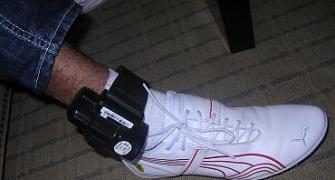"After a long time, I had a good sleep," said Srilekha Kumari (name changed) whose radio tags were removed by US Immigration and Customs Enforcement officials on February 9.
Kumari is one of the Tri-Valley students radio-tagged by the ICE officials on January 19 after the university was shut down. The ICE called it a sham university that illegally brought students to the United States.
Wearing a tag for the past 22 days was humiliating for Kumari, who told rediff.com, "I had sleepless nights."
Kumari is the first person from her family to go abroad for higher studies. She said she came to the US in May 2010 to study health-care management.
"It was a shock when I came to Tri-Valley University. There were only online classes. We were told that the campus is relocating and we would be having classes soon. But two semesters passed and nothing happened. I was planning to get a transfer to another college when the ICE crackdown happened," she said.
She said a relative in India asked her to meet Jayaram Komati, president of the Telugu Association of North America. She along with another radio-tagged roommate met Komati who put them onto attorney Kalpana Peddibhotla.
"I am really thankful to uncle (Komati) and TANA. We got great support from them," said Kumari. Her case is not yet over but she feels she is lucky. "My parents too are supportive. I want to stay back and continue my studies."
Komati said, "I am happy the kids are free. We helped the students and encouraged them to get an attorney to fight their cases."
Peddibhotla said the removal of the tags is just the beginning. "The proceedings are not yet over. They have just removed the radio tags. We are still working with them to get the case terminated. I anticipate that would happen," she said.
She said the students face allegations of immigration violations. "Many students were misled by the university. They were supposed to take full-course study and that allows only one online class."
"These students are victims and should be treated with respect and dignity. They should be able to preserve their rights to continue their studies in the United States," said Peddibhotla.
She is currently handling the cases of eight more radio-tagged students.
"TANA took a very big lead here. They are also providing some of the students with financial resources. Now even the South Asian Bar Association is trying to see what kind of pro bono (free) service their attorney can provide. This case is complicated and requires an experienced attorney," Peddibhotla said adding that she had reduced her fees for the students.
"I am also working with the Northern California South Asian Bar Association to see what kind of advocacy we can do on a national scale," she said.
The removal of tags on two students is only the beginning as the rest 1500 students are still in a quandary whether to stay and risk more money or go back.
Even the advisory posted by ICE indicating that the agency would consider the possibility of reinstating their student visa status using the I-539 form did not bring much excitement among students and attorneys.
Peddibhotla, commenting on I-539, said there are still many unanswered questions. "We do not have information how the US Citizenship and Immigration Services are going to treat these students. These students were from Tri-Valley so there is uncertainty," said Peddibhotla, who is working through some channels and lawyers to find out how it will work.
Ashwani Bhakhri, another attorney dealing with Tri-Valley students, thinks the Indian consulate has not dealt properly with ICE and hence the process is not clear yet. "Are they (USCIS) is going to approve (I-539) or not?" asked Bhakhri, who is worried that the students would go out of status if their I-539 is not approved.
Showing hope for the students on the other hand is attorney Raj Akula, who believes that each student should contact an attorney before contacting or calling ICE. He said some students could even convert to a dependent visa.
"I don't believe that a dependent visa will be rejected. My reasoning is based on the fact that as long as all the status requirements are maintained by the primary visa holder then the dependent visa should not be a problem," said Akula.
Meanwhile Ashok Kolla, chair, student committee of TANA, said, "Students feel more comfortable since ICE has removed radio tag from some students. I think the radio tag issue will be solved soon. But at the same time ICE or Indian consulate should be more appropriate about the guidelines. Students are confused."







